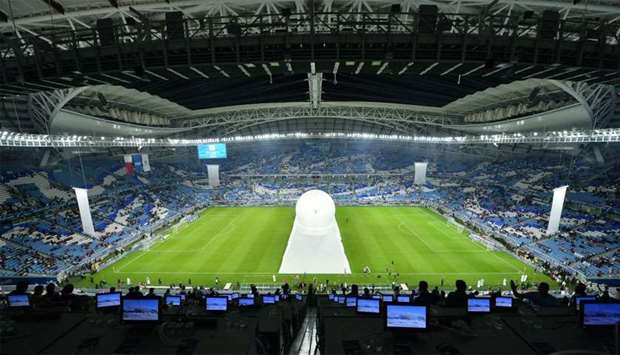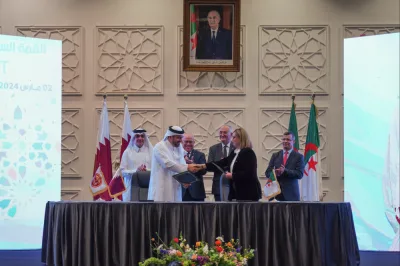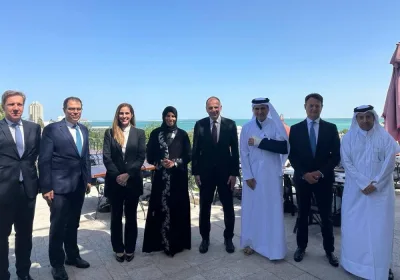"A life of dignity or none at all", that was the sentiment expressed by the people of Qatar when a group of four Arab nations imposed a blockade on the tiny Gulf nation as a "punitive action" for embracing an independent domestic and foreign policy.
On June 5, 2017 Saudi Arabia, the United Arab Emirates (UAE), Bahrain and Egypt severed diplomatic ties with Qatar and imposed a land, air and sea blockade, accusing Doha of supporting militant groups and cosying up to Iran. Qatar has vehemently denied these charges and its accusers have not been able to provide even a shred of evidence to support their conjured up allegations.
Though the plan to "damage" Qatar had been in the making for several years, the operation to realise it was triggered with the hacking of the Qatar News Agency (QNA) in the early hours of May 24, 2017. The hacking followed inserting fabricated news on the official channel which was used as a pretext by the blockading countries to sever all ties with Qatar, less than two weeks later.
However, it did not take much time for the world to know who were the perpetrators behind the this shameful cyber crime. On July 20, 2017, the investigation team of the Ministry of Interior (MoI) revealed that the hacking "originated from the UAE". The probe was assisted by official Western agencies. Several specialised agencies have all independently obtained solid and consistent evidence confirming Qatar’s findings of the involvement of the UAE and Saudi Arabia in the hacking of the QNA’s website. Qatar has since taken many steps to strengthen its cyber security.
Analysts feel the blockading countries were unhappy with Qatar's independent and ambitious domestic and foreign policy.
On the domestic front, aided by its vast hydrocarbon reserves, Qatar has modernised its infrastructure and raised the standard of living of its citizens to the highest in the world - a level other Gulf states have been unable to achieve.
Regarding foreign policy, Qatar's independent regional course led to it supporting popular demands for democratic change in the Arab world, especially during the Arab Spring revolts throughout the Middle East and North Africa.
The young, aggressive leadership in Riyadh and Abu Dhabi saw Doha's policies as standing in opposition to their political views on how regional politics should play out. Thus any country in the region that supports "democratic change" becomes a target.
Because Qatar has used its "soft power" in the form of diplomacy and international media networks to highlight demands for reform in the region, it became marked by the Saudi-Emirati axis.
Addressing the Munich Security Conference in February this year, His Highness the Amir Sheikh Tamim bin Hamad al-Thani said: "Preserving the sovereignty and the independent decision making of countries like Qatar ensures accelerated development - development like free media and free speech, that the blockading countries insist we surrender."
The reckless actions of the siege countries have resulted in eroding the trust among tribes in the Arab world and made the Gulf Co-operation Council (GCC) a dysfunctional bloc which otherwise was a bulwark of Arab solidarity against threats of all sorts.
One of the most painful outcomes of the blockade was the separation of thousands of family members who lived in GCC member states as members of an extended family. Qatari students had to discontinue their education, businessmen were deprived of their commercial interests and investors suddenly found they could no longer access their properties in the blockading countries.
Saudi Arabia, home to Islam's holiest sites, shocked the world by closing the doors for Qatari pilgrims, politicising religion for petty gains.
Meanwhile, Qatar has deepened its strategic co-operation and diplomatic outreach with countries in the region and around the world. It has also expanded trade ties with partners old and new.
The evil intentions behind the hacking was to tarnish the image of Qatar and undermine its sovereignty. But Qatar emerged stronger and bolder from the unjust blockade which is evident from the illustrious past two years, which are replete with many accomplishments that have made the residents of this great country proud.
Qatar has completed many world-class infrastructure projects including stadiums, roads, bridges, five-star hotels, major shopping malls, and launched a preview service for the first part of the Doha Metro’s Red Line.
The Al Janoub Stadium in Al Wakrah was inaugurated on May 16. It was the first World Cup venue to be built from scratch and hosted the Amir Cup final which was attended a record crowd of more than 38,000 people.
During this period Qatar has achieved near self-sufficiency in food production and embarked on ambitious projects to maintain its position as the largest exporter of liquefied natural gas (LNG).
A total of 120 new factories have been established in Qatar since the siege and 60 more large establishments are expected to be completed in 2019.
The efforts of Kuwaiti Amir, Sheikh Sabah al-Ahmad al-Sabah to find "rapprochement among the brothers" has earned him the praise of the international community but has achieved little so far.
The blockade has made it harder to develop inter-regional trade, attract more foreign investment and build on recent successes in turning the region into a global hub in travel, communications, finance and logistics.
It also makes it difficult to envision formal moves to improve security co-operation in traditionally sensitive areas like counterterrorism and intelligence sharing as this relied primarily on the trust generated by shared external threats, bonds of language and religion and deeply rooted business and familial ties.
Analysts feel other small Gulf nations are still at risk of punitive action by the Saudi-Emirati coalition given the underlying conditions that resulted in the blockade still persist.



